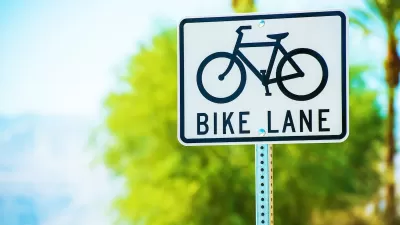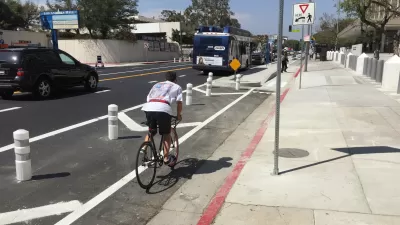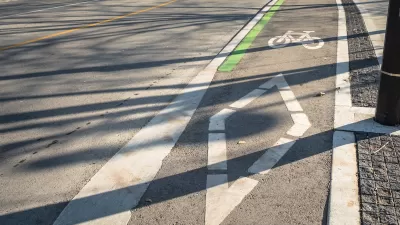A longitudinal study shows that bike facilities don't precede neighborhood change or displacement of residents.

According to research analyzing data from 29 American cities from the University of New Mexico and the University of Colorado, "[t]he installation of new bike infrastructure in neighborhoods does not lead to displacement of people of color, and low-income areas received more 'hard' facilities like buffered or protected bike lanes than high income areas."
Lisa Caballero writes for Bike Portland that "this study was unique in that it distinguished between types of facilities, from sharrows to protected lanes. It found differences in who got what, with lower income areas more likely to receive protected bike lanes." The authors' "interpretation of the results was that increases in the percentage of white people in a neighborhood preceeded an increase in bike facilities more so than the reverse, bike facilities preceeding a change in demographics."
According to Kea Wilson of Streetsblog:
[S]tudy co-author Nick Ferenchak was careful to note that the finding did not mean that U.S. transportation planners are necessarily doing a great job at using cycling as a tool for broader mobility justice. In particular, the data revealed that transportation leaders aren’t delivering equal access to new bicycle infrastructure for people of color — and in the context of a quantitative analysis, they couldn’t determine whether transportation leaders were delivering equitable access to the transportation infrastructure for which those communities are actually asking, if leaders are even asking at all.
"Low-income people, meanwhile, are getting better access to meaningful bicycle infrastructure than some may expect — though maybe not as fast as those communities actually need," considering that "39 percent of bike commuting is done by the lowest-income quartile in the U.S." Ferenchak concludes that, while "gentrification is a complex set of forces that goes beyond displacement," we now know "we can go ahead and build the bike lanes. We know we’re not going to be displacing people just by doing that."
FULL STORY: Study suggests bike lanes do not lead to displacement, gentrification

Alabama: Trump Terminates Settlements for Black Communities Harmed By Raw Sewage
Trump deemed the landmark civil rights agreement “illegal DEI and environmental justice policy.”

Study: Maui’s Plan to Convert Vacation Rentals to Long-Term Housing Could Cause Nearly $1 Billion Economic Loss
The plan would reduce visitor accommodation by 25% resulting in 1,900 jobs lost.

Planetizen Federal Action Tracker
A weekly monitor of how Trump’s orders and actions are impacting planners and planning in America.

Wind Energy on the Rise Despite Federal Policy Reversal
The Trump administration is revoking federal support for renewable energy, but demand for new projects continues unabated.

Passengers Flock to Caltrain After Electrification
The new electric trains are running faster and more reliably, leading to strong ridership growth on the Bay Area rail system.

Texas Churches Rally Behind ‘Yes in God’s Back Yard’ Legislation
Religious leaders want the state to reduce zoning regulations to streamline leasing church-owned land to housing developers.
Urban Design for Planners 1: Software Tools
This six-course series explores essential urban design concepts using open source software and equips planners with the tools they need to participate fully in the urban design process.
Planning for Universal Design
Learn the tools for implementing Universal Design in planning regulations.
Caltrans
Smith Gee Studio
Institute for Housing and Urban Development Studies (IHS)
City of Grandview
Harvard GSD Executive Education
Toledo-Lucas County Plan Commissions
Salt Lake City
NYU Wagner Graduate School of Public Service





























